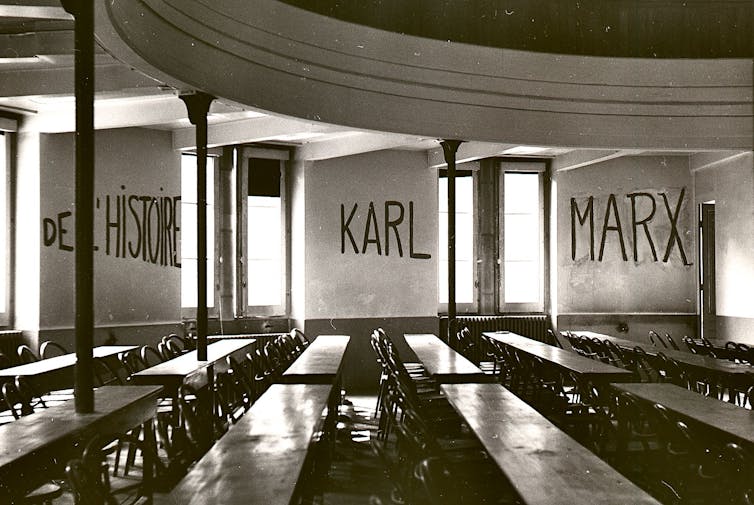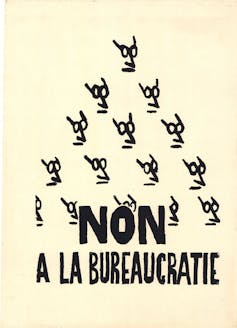Be realistic – demand the impossible: the legacy of 1968
- Written by Simon Tormey, Professor of Political Theory and Head of the School of Social and Political Sciences, University of Sydney
This article is the first of the Revolutions and Counter-Revolutions series, curated by Democracy Futures as a joint global initiative between the Sydney Democracy Network and The Conversation. The project aims to stimulate fresh thinking about the many challenges facing democracies in the 21st century.
The events of May 1968 in Paris and then France more generally still resonate as a graphic illustration of the potential for relatively peaceful and wealthy societies to explode in spontaneous anger.
May 1968 was not an uprising against tyranny or manifest injustice of a kind that animated the civil rights movement. Starting out as a set of demonstrations against university reform, the French uprisings quickly gathered momentum in a manner that almost defies explanation.
Part student revolt, part disillusionment with various aspects of contemporary existence, part trade union opportunism and part extended street party, everyone’s account of why it “kicked off” seems to differ.
Assessing the legacy of ’68 is just as demanding as providing an explanation for why it happened at all. Little remains in the way of lasting institutional impressions. The uprising disappeared almost as quickly as it had erupted once the militarised police imposed order.
On the surface, then, though this brief and spontaneous episode marked the emergence of “post-materialist” concerns amongst the young, it was of little consequence for contemporary purposes. Yet scratching beneath the surface of this Wikipedia-style narrative, it is possible and perhaps necessary to mount a more serious defence of the legacy of ’68.
Certain themes and tropes are very evident in today’s politics. Let’s start with some obvious pointers.
The collapse of grand narratives
1968 can be seen as the moment when the two dominant narratives on the left – social democracy and communism – were both called into question.
Social democracy had dominated mainstream progressive discourse since the end of the 19th century. Now it was seen as irredeemably complicit in the maintenance of a status quo that seemed to consecrate a materialist, routine form of life offering very little to the young or to the political imagination.
Social democratic politics was held as “capitalism with a human face”. It accepted the necessity for the market order and so, as far as ’68 critics of capitalism were concerned, for exploitation, alienation and the division of society into pharaohs and slaves.
Social “democracy” reduces politics to an electoral spectacle, and our place within it to passive recipients of whatever it is a rotating set of elites deems to be in our best interests. The insurgents of 1968 searched for something more than a passive quiescent existence built around consumption.
‘The old left thought the new left was out of control – they had impossible dreams.’Historically, the principal alternative to social democracy on the left had been communism, the militant ideology of Lenin and his followers.
But communism according to influential critics on the fringes of ’68 – such as Cornelius Castoriadis, Jean-Francois Lyotard and Claude Lefort, all members of the ultra-left Socialisme ou Barbarie group – had ossified into a debased ideology guarded by a self-interested theocracy. It had gone from a vital credo of insurrection to a doctrine maintained and guarded by bureaucrats.
The communist vision of revolution – an industrial working class led by an intellectual class – was now an anachronism.
By 1968, the working class had given up on the dream of its own emancipation in favour of chatter around holiday pay, generous pensions and the trifles that made existing life more bearable. It had lost its heroic capabilities, settling instead for indolent acceptance of a comfortable “air-conditioned” existence.
So, calls against social democracy and communism exploded on the streets of Paris under joyously enigmatic slogans:
Be realistic: demand the impossible! Under the cobbles, the beach! It is forbidden to forbid!
 ‘It is forbidden to forbid!’
Espencat/Wikipedia Commons
‘It is forbidden to forbid!’
Espencat/Wikipedia Commons
However, quite what it was that the demonstrators wanted was often difficult to discern. Much of the discourse of 1968 rotated around the idea of auto-gestion or self-management. But almost implicit in the idea was the rejection of normative ideals or frameworks of a kind that we associate with classical ideologies.
Also implicit was a rejection of the idea of the leading role of intellectuals in terms of that task of framing.
The net result was a politics of refusal – of social democracy, of communism, of capitalism, of elites, vanguards, intellectuals, and so on and so forth. But where, it could legitimately be asked, was affirmation?
Those engaged in the uprising were clear about what they were against; they were less clear in terms of what they were actually for in concrete, institutional terms. Auto-gestion was a difficult term to operationalise. It still is.
So, 1968 represents the end of grand narratives in politics. It was an uprising against something; less for something else.
The sense of ’68 as a refusal lives on in contemporary politics. We don’t have a redemptive ideology to place our hopes on. We don’t believe the “experts”. We don’t think there’s a formula for collective planetary happiness. We have individualised politics to the point where refusal is a first, and quite often last, resort.
Lyotard famously described this “incredulity” towards metanarratives as “the postmodern condition”. The result was a kind of political paganism, a politics of the faithless, of those who move from one campaign against injustice to another, only without any certainty that there is another way of life, model or system that could, in a sense, “cure” the ills of modernity.
The end of the party
Related to the collapse of dominant narratives was a collapse in faith in organisational politics, more familiarly the political party, the dominant form of collective mobilisation since the 19th century.
The party could not, as per Marxist teaching, represent the interests of the working class. Nor could it evade the kind of bureaucratic ossification outlined most famously by Robert Michels and Jean-Paul Sartre.
Perhaps the idea of a permanent or standing organisation of any kind was the problem. 1968 therefore marked the embrace of what later became known as “horizontal” forms of organisation in the search for a kind of being together that celebrated all manner of differences and, at the same time, provided the basis for collective action.
The rejection of inherited organisational politics in 1968 has been felt very clearly in more recent times. Established in 2001, the World Social Forum went as far as banning participation by political parties and their representatives. Parties, it was claimed, contaminated “dialogue” and, hampered by considerations of loyalty or affiliation, prevented the free flow of opinion.
Later, high-profile initiatives such as Occupy Wall Street and Spain’s #15M also made clear their distance from the inheritance of left progressive politics and, in particular, the “vertical” politics of parties and formalised mechanisms of representation.
Living with(out) capitalism
1968 unleashed a wave of “post-materialist” energies directed at capitalism. Capitalism became the object of anger less because it was failing in some distinct fashion, but more because it was succeeding, or more accurately it was succeeding in creating subjects, ourselves, who needed capitalism and who wanted capitalism to succeed.
The consumer age was dawning after the austerity of the post-war years. This meant putting the desiring subject, rather than the producer, at the centre of the system of reproduction. Hitherto radical analyses of capitalism had concentrated on the experience of the producer or worker.
 Graffiti in a classroom at the University of Lyon that appeared during a student occupation of parts of the campus in May 1968.
George Garrigues/Wikipedia Commons
Graffiti in a classroom at the University of Lyon that appeared during a student occupation of parts of the campus in May 1968.
George Garrigues/Wikipedia Commons
Many found their origin in Marx’s pungent critique of capitalism in works such as the 1844 Paris manuscripts. These described the alienating properties of capitalist production in almost poetic terms.
But what lurked in these earlier works was an appreciation of the way in which we as consumers were ensnared by the logic of capitalist reproduction through the fetish properties of commodities themselves.
It was this latter aspect that became such a prominent feature of the critiques of capitalism that both inspired and were in turn inspired by 1968. They found their ultimate expression in the work of The Situationists, notably via Guy Debord and Raoul Vaniegem. They describe contemporary capitalism as engaging with us at the subliminal level through the manipulation of desire via advertising and the saturation of the visual and aesthetic field with “affirmative” messages designed to encourage further consumption.
Many involved in 1968 turn to psychoanalysis to explain how it was that capitalism appeared so adept at creating followers in the midst of its own inhumanity. Work such as Deleuze and Guattari’s Anti-Oedipus and Lyotard’s Libidinal Economy looked for the key to unlocking a joyful subject beneath the cramped subject of consumerist desire.
These critiques reflect and in some cases inspired the approach adopted by many of those taking part in the events of 1968. One of the legacies of the uprisings was the rich use of slogans, posters, films and cartoons to engage the senses.
Out of 1968 came a distinct political strategy, detournement, in today’s lingo “jamming” or “hacking”. The idea here is to take images of an everyday kind, such as those appearing in advertising, and in some way distort them so they produce an opposite effect – while at the same time reminding us of the chilling manipulation of desire that lies beneath.
The idea is to create a meme that reminds us of the fetish quality of everyday existence and the instrumentalisation of our world in the search for profit. By overturning the integrity of the image or the words we remind ourselves of the contingency of social arrangements, of hierarchies and the mode of exploitation.
This strategy has become a powerful source of inspiration for today’s anti-establishment resistances, from the glossy pages of Adbusters, through to the humorous “liberation” of billboards, guerrilla gardening, critical mass and other seemingly spontaneous “laboratories of insurrection”.
Today’s activists feed off and are inspired by the legacy of 1968’s suspicion that the only way to overcome capitalism is to challenge the spectacle of elite domination in the visual field, at the level of affect, and in the very constitution of our subjectivity.
 Adbusters today practises the distinctly 1968 strategy of detournement as a form of resistance.
PBS NewsHour/flickr
Adbusters today practises the distinctly 1968 strategy of detournement as a form of resistance.
PBS NewsHour/flickr
Activists are aware of the mediated nature of contemporary existence and therefore of the power of images, sounds and experiences passing through the circuits of the capitalist life world.
A politics that does not engage us at the level of our emotions, our desires and our deeper needs cannot hope to produce that sense of connection to a wider purpose that is the starting point for mobilisation.
What’s left of 1968’s left?
1968 did not lead to an overturning of French capitalism, of the domination of elites, or the structures of inequality. Far from it.
But the legacy of 1968 runs deep in terms of how a good part of the left “assemblage” sees its task and goes about seeking to accomplish it.
1968 represents the inauguration of a politics of refusal: refusal to be incorporated into dominant narratives; refusal to conform to a logic of political mobilisation that has been practised for over three centuries; refusal to deploy the organisational forms so familiar from previous models of collective action.
1968 represented a freeing up of politics from the congealed, stodgy and unimaginative understandings that had so dogged the emergence of an oppositional politics after the second world war. It unleashed a wave of joyous experimentation, evanescent and spontaneous efforts to challenge the dull routine of the repetitious lives that had been constructed in and through advanced capitalism.
 ‘No to the bureaucracy’: street art from the 1968 revolts.
IISG/flickr
‘No to the bureaucracy’: street art from the 1968 revolts.
IISG/flickr
The rejection of political inheritance and the embrace of a more fluid and experimental style of politics is not without its own pitfalls, challenges and critics. One can almost hear the Zizeks and Mouffes intoning against forms of politics that dispensed with the militant collectivism associated with the Leninist tradition in particular.
Where is the institutionalisation, or rendering permanent the demands of this assemblage? Where is the attempt to create the necessary counter-hegemonic structure that will provide a genuine force to challenge the state, the ruling class and the repressive apparatus? Where is the desire for seeing through a program designed to ameliorate the conditions of the least well off?
There is a certain obvious way in which this stony-faced realism misses the point. This is that the linearity of politics, the sense of a common collective endeavour undertaken by a mass of like-minded citizens toward a common goal, is precisely what was challenged in 1968.
Those who took to the streets didn’t know what they wanted; they just knew what they were against – routine, elites, boredom, mortgages, certainty. They wanted to construct something new together, but they didn’t have the tools or the vocabularies to do that in the brief window of opportunity that presented itself.
John Holloway gets close to this atmosphere when he notes that politics often starts from “a scream”. 1968 was a scream, an alarm bell going off, a red light flashing. It told us that the certainties that had sustained the post-war order – the promise of more jobs, more stuff to buy, happier and more contended lives – was not enough. It was not exciting, interesting, fulfilling.
But nor was the narrative of emancipation “enough”. It didn’t engage. It too was hostage to a set of expectations that a generation fed on austerity had enough of hearing: the heroism of the working class locked in its cycle of repetitious labour, greasy hands and greasier chips.
1968 was the scream of the “post-materialists”: those in search of colour in a black-and-white world. May 1968 did not change the world, but it made us look differently at the world we have and the world being created. It made us think that maybe – beneath the cobbles – there is another world.
Authors: Simon Tormey, Professor of Political Theory and Head of the School of Social and Political Sciences, University of Sydney
Read more http://theconversation.com/be-realistic-demand-the-impossible-the-legacy-of-1968-87362





